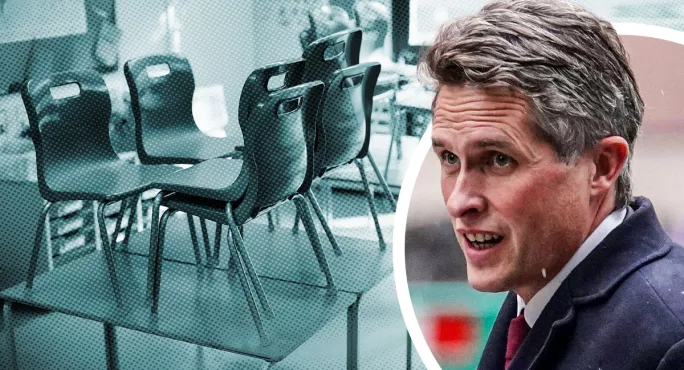Williamson: 2021 school closures were ‘wrong’

Closing schools in January 2021 was “wrong” and the result of a panic decision, Sir Gavin Williamson has said.
In written evidence published by the Covid Inquiry today, the former education secretary also said he disagreed with imposing social distancing rules in schools during the pandemic.
“We should have got children back into school sooner,” he wrote in evidence to the inquiry on the decision to close schools, adding that then prime minister Boris Johnson “did not give my advice sufficient weight or sufficiently take children’s interests into account”.
Sir Gavin also felt that the decision was “wholly unnecessary”, considering schools were able to stay open amid previous high Covid rates in northern towns and cities.
- Related: Covid messages show ministers’ ‘contempt’ for teachers
- Boris Johnson: Schools were ‘terrific Covid reservoirs’
- Research: Pandemic catch-up must focus on disadvantaged pupils
The former education secretary added that, by the end of 2020, there was “unequivocal evidence” that closing schools was “damaging for children’s education, development and health”.
“I still believe that the decision did not sufficiently take children’s interests or wellbeing into account. It was a panic decision, made without having children’s interests front and centre”, Sir Gavin told the inquiry.
Williamson’s plans ‘probably feeble’
His evidence is in stark contrast to Mr Johnson, who said he had been “desperate to keep schools open” before they were closed for the second time in early 2021.
The decision to shut classrooms in January came after a surge in Covid cases at the end of 2020.
Mr Johnson told the inquiry that he had “listened respectfully” to his colleagues, including Sir Gavin, who wanted to keep schools open, but that schools had been shown to be ”terrific reservoirs” of the virus.
Notes made by Sir Patrick Vallance, who was then chief scientific adviser, alleged that the former prime minister called Sir Gavin‘s plans for schools ”probably pretty feeble” at the time.
Addressing the inquiry, Sir Gavin said that the negative effects of school closures have been seen especially on the most disadvantaged children, a concern also raised by former children’s commissioner Anne Longfield.
Pandemic disruption
Analysis conducted by the Office for National Statistics showed that pupils in deprived areas were almost twice as likely to report falling behind in their education owing to pandemic disruption.
Sir Gavin also told the inquiry that while he understands why the decision was made to enforce social distancing in education, he now believes that this was wrong.
“They should have advised for changes to these rules, so all children could have come back to school sooner and benefited from being at school. This was in the best interests of children’s health and wellbeing”, Sir Gavin said.
Social distancing in schools ended in the summer term of 2021 although schools could choose to continue measures until the end of the term.
Williamson considered resigning
Sir Gavin also admitted that he “did very briefly consider whether I should resign”, but he ultimately decided not to as “he felt it was not the right thing”.
“I respect Cabinet collective responsibility. It means that when you lose a debate in private, you need to defend it in public,” he told the inquiry.
The former Cabinet minister revealed that he was also concerned that “resigning would distract attention away from the key policy issues and focus attention on personal political issues”.
Reflecting on his time as education secretary, Sir Gavin recommended that “in making major policy decisions during a crisis, the prime minister and Cabinet need stronger safeguards in place to take account of children and young people’s interests better”.
“If, in exceptional circumstances, school closures cannot be avoided then it is incredibly important to have a clear, established and transparent process for how the government would move to take this step,” he added.
‘Lessons to be learned’
A government spokesperson said: “Throughout the pandemic, the government acted to save lives and livelihoods, prevent the NHS being overwhelmed and deliver a world-leading vaccine rollout which protected the nation.
“We have always said there are lessons to be learned from the pandemic and we are committed to learning from the Covid inquiry’s findings, which will play a key role in informing the government’s planning and preparations for the future.”
The first report on the inquiry hearings is due in 2024, while public hearings on the impact of the pandemic will run from next autumn.
You need a Tes subscription to read this article
Subscribe now to read this article and get other subscriber-only content:
- Unlimited access to all Tes magazine content
- Exclusive subscriber-only stories
- Award-winning email newsletters
Already a subscriber? Log in
You need a subscription to read this article
Subscribe now to read this article and get other subscriber-only content, including:
- Unlimited access to all Tes magazine content
- Exclusive subscriber-only stories
- Award-winning email newsletters



